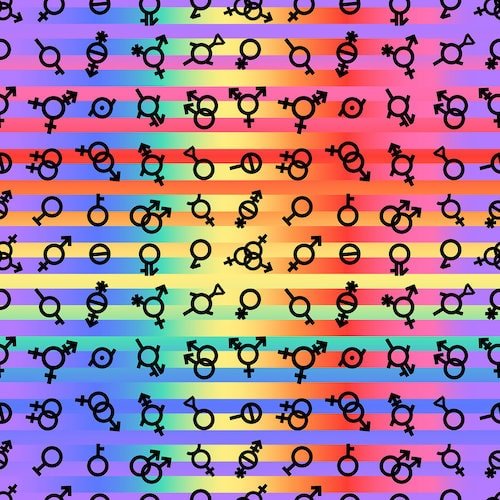Understanding Gender Identity
Written by Ty Neely, M.S., LPC-Associate
What is Gender and Gender Identity?
For many people, this may seem like a silly question. Many don't think much about their gender and how they define it. Cultures from around the world have had a strong focus on men versus women for a long time. Women have had different rights, advantages, and experiences than men across the globe. In fact, they still do in many places. Men and women have different societal expectations.
Gender is Made of More than Just Physical Anatomy
Whether it be roles within relationships, families, how they dress, how they play, who they love, and how they work, only to name a few. When most people think of gender, they think of the genitalia we are born with and our chromosomal make-up. But, these things refer to our biological sex, not gender. Gender is how we express ourselves relating to masculinity and femininity. It does not have to do with our biological sex.
Additionally, some people are born intersex. This means that they have both male and female sexual genitalia and chromosomes. In these cases, doctors and parents often choose the sex and gender for the child to identify as for their life. In a similar way, we may see a new baby that is born with a penis and XY chromosomes. In this case, our culture paints their room blue and gives them cars, trucks, and baseballs to play with. Why? Because society expects boys to like those things. Our society also expects girls to like dolls, pretty dresses, and colors like pink and purple.
Stepping Outside of Gender Norms
So, what if a child born with a penis likes to play with dolls and dance ballet? What about people with vaginas that like to wrestle and play in the mud? This is why gender is different from sex. Gender is how we express ourselves on the gender spectrum. As a girl or woman, you may be very masculine in some ways and feminine in others. How we express our gender is part of our identity and who we are deep down.
What Defines Being Transgender?
We're assigned a gender at birth due to our genitalia. Then, we grow, mature, and learn about our authentic selves and gender expression. We experience gender in our daily lives and how others see us. By doing so, we can develop expectations for ourselves based on our gender. Sometimes we recognize that what everyone is saying we should be is not who we are.
Being feminine when you are assigned the male gender at birth does not mean that you are trans. Many men are very feminine on the gender spectrum. In a similar way, many women are very masculine on the gender spectrum. But, they still identify with the gender assignment they received at birth. When we feel that our birth gender assignment isn't right, we recognize that another gender better defines who we are. In these cases, we may consider ourselves to be transgender or trans.
Being trans doesn't mean that someone has plans to have gender affirmation surgery. It also doesn't mean that they must take hormones. Being trans means that one does not identify with the gender identity they received at birth. How a trans person decides to express their authentic gender is completely up to them. It is something that is unique to their experience.
As an ally to trans people, please never assume that they must or plan to undergo surgery. Or, hormone replacement therapy.
Ok, so How Does all of this Gender Talk Apply to Me?
How do you define your gender? How do you express your gender? Take some time to think about where you fall on the masculinity-femininity spectrum. How you view the spectrum is based upon your cultural experience of gender. Along with how masculinity and femininity are defined for you and your culture. Some cultures have very different views on masculinity and femininity. Where you may be very masculine in one context, you may be more feminine in another. Do you identify with the gender that you received at birth? If so, you would call yourself cisgender/cis-male/cis-female.
Do I even fall on the spectrum at all?
Some of us do not believe that our gender identity falls upon a binary. We may not identify as masculine or feminine and identify our gender outside of the two. In this case, we may call ourselves genderqueer or non-binary. Or, we may use any of the various other identities that we may feel describes our gender experience.
Some of us may feel that our gender identity is fluid. This means our gender changes often and is not solidified within any specific box. Then we may call ourselves gender fluid or again, genderqueer.
When you are thinking through your gender experience, what answers come up for you? How do you feel you express your gender? Where do you lie on the spectrum or off of the spectrum? What feels authentic to you?
Am I Trans?
Recognizing that you are trans can be a hard process. As you think through your authentic gender identity, think about the following questions:
Have I ever felt like I did not fit in with my assigned gender?
Have I ever dreamed of being a different gender?
Have I ever disliked my genitalia? Have I ever wanted to change my genitalia?
Have I ever disliked parts of my body that make me feel masculine or feminine?
When people reference my assigned gender, does it cause me discomfort, pain, or any other negative emotions?
Someone called me another name, gender, or pronoun, and they have different gender expectations for me. Does that make me feel relief, happiness, or peace?
While this is not a full assessment for exploring the concept of being trans, it could be a helpful start. Consider reaching out to an LGBTQ therapist if you are unsure about your authentic gender identity.
I Think I am Trans, Now What?
If you are reading this and thinking that you may be trans, that could be both exciting and terrifying. You may have excitement because you are finally recognizing what has felt off for you for much of your life. Many trans people feel a disconnect with themselves from a young age. But may not be able to pinpoint what is wrong and what is making them feel this way until later in life. Recognizing what has been making you feel negative emotions for so long can be a very freeing moment. This may include depression, anxiety, anger, confusion, and/or any other potential feelings. It can also be a terrifying moment as there is a lot of stigma in our world around being trans. So, the transitioning process can seem daunting and overwhelming.
First, find a therapist that understands and is sensitive to gender identity. Having LGBTQ support through this self-exploration process can help you understand yourself a more full way. Together, you can explore different ways to test your gender identity and expression.
Trans Transitions
Once you recognize you are trans, a big decision to make is whether you want to undergo a transition. If so, what types of transitions and to what extent. Trans individuals often undergo three types of transitions: social, legal, and physical.
Social transitions may include coming out to people in your life as trans. Or, asking for people to use different pronouns for you and even a different name. It may also involve expressing your gender through clothes, interests, and other ways. in a more authentic way.
Legal transitions may include changing your legal name, your gender marker on your driver’s license/ID, and working through any other legal/paperwork concerns. This involves anywhere your gender is recorded differently from your authentic gender identity.
Physical transitions may include hormone replacement therapy and gender affirmation surgery. This may include either top, bottom, or both.
Every person’s transition is different. No transition is wrong or incorrect. Do whatever feels right to you and at your own pace. Do not feel you need to rush in and do everything at once. Feel the freedom to undergo this journey at your own pace and in your way. It is all about authenticity, right?
My Child Says They are Trans…How do I Respond?
As a parent of a child or teen that comes out as trans, this may be a shocking and scary experience for you as well. Your first step should be to find a skilled child therapist to walk with you on this journey. They will be able to talk through gender identity and help them start to solidify their understanding of their gender identity. Many children may recognize they are trans at a young age and others may not notice until much later in life. Childhood, and especially teenage years, is a time to explore and discover who we are as people. Try to allow your child the freedom to explore their gender. Give them a safe, freeing place, without judgment or shame from you. If they ask you to use different pronouns, try to do so. If they want to try a different name, try using it. I know this may be difficult as you may feel like you are losing your little boy or girl. But, remember that you are not losing your child. They are still who they have always been underneath. Teen therapy can also provide support for your child through this experience.
HRT and Puberty
If your child is around the age of puberty, recognize that they may be fearful of developing. Discuss with your child’s therapist about hormone blockers. These can postpone puberty if they are exploring their identity and are unsure. If you, your child, and your child’s therapist are sure that the child wants to start hormone replacement therapy, consider doing so before puberty. It can have some life-altering, positive effects.
Puberty is the time that the hormones assigned to our biological sex start to transform us into adults. This is when we become more masculine or feminine. By starting HRT before or during puberty, trans people have a better chance of having a physical appearance that matches their authentic gender identity. It can still happen later in life, but before puberty does allow for even greater results. Again, seek the help of a teen therapist who can help guide you and your child through this experience.
Receive LGBTQ Support in Houston, TX
Exploring your gender identity isn’t something you need to do alone. An LGBTQ therapist can offer a place for you to learn more about yourself, and grow into your most authentic self. We offer from our Houston, TX-based counseling practice. To start your therapy journey, follow these simple steps:
Contact Heights Family Counseling to schedule an appointment
Meet with a caring LGBTQ therapist
Start embracing your most authentic self!
Other Therapy Services Offered by Ty Neely at Heights Family Counseling
Ty offers a variety of mental health services for teens, adults, and couples at our Houston Heights Therapy Clinic. His mental health services include adult therapy, Tween and Teen Counseling, life transitions, couples therapy, work burnout, LGBTQ Friendly Therapy, depression treatment, and anxiety treatment. He also offers online therapy in Texas to meet your mental health needs when you can’t make it to our therapy clinic. To learn more please visit our blog, contact our counseling office, or visit Ty Neely's Bio.


